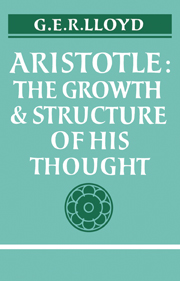Book contents
- Frontmatter
- Contents
- Preface
- Abbreviations
- PART I INTELLECTUAL DEVELOPMENT
- PART II FUNDAMENTALS OF ARISTOTLE'S THOUGHT
- 6 Logic and metaphysics
- 7 The physics of the heavenly region
- 8 The physics of the sublunary region
- 9 Psychology
- 10 Ethics
- 11 Politics
- 12 Literary criticism
- 13 Conclusion
- Suggestions for farther reading
- Glossary of Greek terms
- Index of passages referred to
- General Index
6 - Logic and metaphysics
Published online by Cambridge University Press: 06 July 2010
- Frontmatter
- Contents
- Preface
- Abbreviations
- PART I INTELLECTUAL DEVELOPMENT
- PART II FUNDAMENTALS OF ARISTOTLE'S THOUGHT
- 6 Logic and metaphysics
- 7 The physics of the heavenly region
- 8 The physics of the sublunary region
- 9 Psychology
- 10 Ethics
- 11 Politics
- 12 Literary criticism
- 13 Conclusion
- Suggestions for farther reading
- Glossary of Greek terms
- Index of passages referred to
- General Index
Summary
The first part of this study has been devoted to giving the outlines of Aristotle's intellectual development. In the second I shall take the main branches of his work in turn and attempt to describe and elucidate the fundamentals of his thought, locating his principal ideas in the context of the philosophical and scientific discussions of the time, and assessing their value and importance. The first general field I shall consider is logic. Here his work is particularly comprehensive, very largely original and for the most part eminently lucid. It is, moreover, highly professional, and the specialist will find a great deal that is of interest in the logical treatises apart from those sections of them that contain what still remains an excellent introduction to the study of elementary logic. For the sake of illustrating his work in this field, however, it will be enough to select three topics for particular comment, his doctrine of categories, his syllogistic and his conception of so–called ‘scientific’ knowledge.
The logical treatises, known collectively as the Organon or ‘tool’ of thought, begin with two short works, the Categories and the de Interpretatione, dealing with terms and with propositions respectively. The first chapter of the Categories, for example, begins by drawing distinctions between things named (1) ‘homonymously’, (2) ‘synonymously’ and (3) ‘paronymously’. Things are named ‘homonymously’, first, when they have only the name in common and the definition corresponding to the name is different in each case.
- Type
- Chapter
- Information
- AristotleThe Growth and Structure of his Thought, pp. 111 - 132Publisher: Cambridge University PressPrint publication year: 1968
- 2
- Cited by



